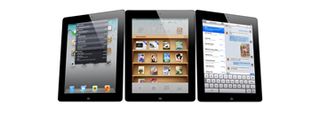Watch out, RIM -- Apple warming up to corporate market
Today was supposed to be a good day for Research In Motion.
 After all, however sorry it may be that this now passes as good news for the company, a big headline on the Star.com read last night, “RIM shares briefly outperform Apple.”
After all, however sorry it may be that this now passes as good news for the company, a big headline on the Star.com read last night, “RIM shares briefly outperform Apple.”
Yes, you could see it now. Jim Balsillie and Mike Lazaridis, with their stock forecast upgrade and fancy new operating system, had to be feeling pretty good. Chests puffed out. Cigars freshly lit. The works.
Only, then, you read this feature in the New York Times, and suddenly the BlackBerry maker seems like the Titanic circa early April, 1912, all over again.
Indeed, at the same time RIM seemed to be making back some ground against its arch rival, an article in the NYT suggests Apple is now targeting, and already conquering, the one arena where BlackBerry still wears the crown.
*Bing: How BlackBerry can bounce back
According to the Times, Apple is making inroads much more effectively with the corporate world today, already being adopted by several major companies with countless others knocking on the door.
Of the Fortune 500 companies, Apple execs said last month, 92 per cent are now testing or deploying iPads to employees, while a further 93 per cent are testing or deploying iPhones. Lowe’s, the DIY warehouse mega-chain, recently bought 42,000 iPhones to be used by workers on its store floors, and all pilots flying United and Continental Airlines are being issued iPads for use in the cockpit.
Certainly, this must feel like the tightening of the noose for RIM. While it will still hold a massive get-there-first market share among businesses and corporations, Apple is proving that the BlackBerry and PlayBook (alright, nobody’s using the PlayBook) aren’t the only tech devices capable for use in the business world.
What’s interesting to note is what was behind Apple’s failure to capitalize on the corporate sector in the first place.
The Times reports that the late Steve Jobs, Apple’s founder and longtime cantankerous CEO, had little respect for large companies and tailoring to their needs, even calling chief execs “orifices” at a conference back in 2005.
Yet with Jobs’ passing, Apple may be finally rounding the corner into corporate turf. Former COO and current boss Tim Cook has long been the man that dealt with corporate customers at Apple, and is known to be far more at ease catering to the business crowd than his predecessor.
One important note: the secrecy that makes Apple great for the consumer market may hinder its adoption into the corporate realm. The Times notes that while a cloud of mystery as to where Apple products are headed only piques interest among everyday shoppers, big companies with big budgets to manage won’t much care for not knowing where their business IT is going – or how much it may cost.
Though those are problems with solutions for Apple. Today, at least, the answers for RIM don’t seem so apparent.
By Jason Buckland, MSN Money




Posted by: Tech dude | Nov 19, 2021 7:19:15 PM
I hate to say it as a proud Canadian but what RIM really should have done to stay on top was to move to California. Yes, the Blackberry was a brilliant idea that was ahead of its time. But the reality is you need to constantly keep improving your product if you want to make it in the long run. And to do that you need to be surrounded by real good people in a tech hotspot-- somewhere like silicon valley in California where Apple (and scores of other high tech companies are) Or Seattle where companies like Microsoft, Boeing and Google choose to be. I hate to say it but the reality is Ontario can't provide the kind of high tech people needed to have a high tech headquarters--they'r having a hard enough time hanging on to relatively low tech the car industry.
Posted by: Darwin | Nov 19, 2021 8:47:30 PM
Well, as a relatively new Apple customer (owning a Mac Air), I must admit that I am blown away with what a Mac can do. I am also happy with what it can't do well and that is attract viruses. With so many viruses being targeted towards 'big business', in my opinion, does that mean that Apple targeting the big business sector will mean that the virus people will turn on Apple? Maybe Steve Jobbs had another amazing marketing strategy at keeping the hackers off his back, he was 'just an ordinary guy'. Perhaps stating that he did not like the big companies gave him an attachment to the 'ordinary people' and a like-ability whereby the virus people chose to leave him alone.
I fear that if the Apple products head towards targeting the 'big business' sector, the viruses may start targeting the Apple. Kinda puts a new twist on finding a worm in your apple. If people can turn on Blackberry so quickly, I am certain it can happen (unfortunately) to Apple.
As for Canadian products, I am still a big fan of Correl and Word Perfect. Even our government turned on them and went to Microsoft. Not sure if moving to silicon valley is the answer, but there is certainly strength in numbers. I hope I can continue to be impressed with the Apple product, as I am looking for a new cell :-)